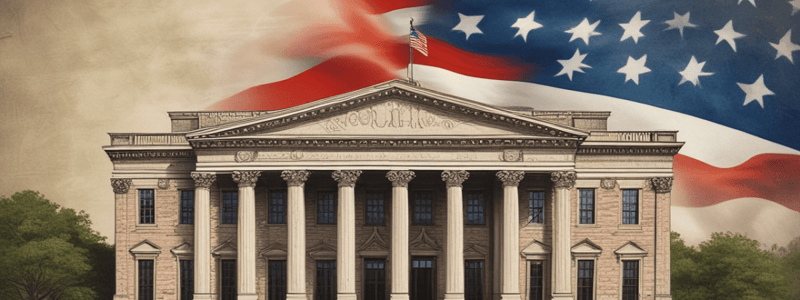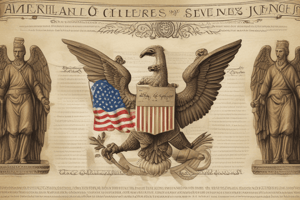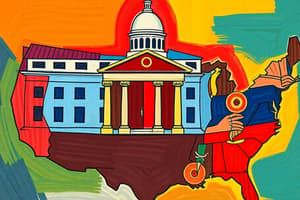Podcast
Questions and Answers
What was the primary focus of the New Deal initiated by US President Franklin Roosevelt?
What was the primary focus of the New Deal initiated by US President Franklin Roosevelt?
- A series of laws that limited the power of the federal government
- A set of policies that favored big businesses and corporations
- A program aimed at reducing the power of the US Supreme Court
- A series of social programs that transformed people's views of the federal government (correct)
What is the highest form of law in the United States?
What is the highest form of law in the United States?
- International law
- Federal law
- State law
- Constitutional law (correct)
What is the primary role of the US Supreme Court in the US court system?
What is the primary role of the US Supreme Court in the US court system?
- A trial court
- A court that makes new laws
- A court of appellate jurisdiction (correct)
- A court of original jurisdiction
What was the significance of the landmark case Marbury v. Madison?
What was the significance of the landmark case Marbury v. Madison?
What is the most significant power exercised by the US Supreme Court?
What is the most significant power exercised by the US Supreme Court?
What is the primary purpose of a Select Committee in Congress?
What is the primary purpose of a Select Committee in Congress?
What is the term for a procedural move that attempts to halt the passage of a bill?
What is the term for a procedural move that attempts to halt the passage of a bill?
What is the role of the President as 'chief of state'?
What is the role of the President as 'chief of state'?
What is the most important determinant in a successful congressional campaign?
What is the most important determinant in a successful congressional campaign?
What is the term for a special form of representation, providing personal aid to a constituent or group of constituents?
What is the term for a special form of representation, providing personal aid to a constituent or group of constituents?
What is the compilation of all the laws passed by the US Congress?
What is the compilation of all the laws passed by the US Congress?
What is the minimum number of electors a presidential candidate must secure to be elected president?
What is the minimum number of electors a presidential candidate must secure to be elected president?
What is the role of the Office of Management and Budget (OMB)?
What is the role of the Office of Management and Budget (OMB)?
Who is the head of the Department of Justice?
Who is the head of the Department of Justice?
What is the order of presidential succession if both the president and vice president are unable to govern?
What is the order of presidential succession if both the president and vice president are unable to govern?
What is the main factor that led to the eventual ratification of the US Constitution?
What is the main factor that led to the eventual ratification of the US Constitution?
Which branch of government is described in Article III of the US Constitution?
Which branch of government is described in Article III of the US Constitution?
Which concept in the US Constitution states that national laws prevail over conflicting state laws?
Which concept in the US Constitution states that national laws prevail over conflicting state laws?
What do the Amendments 4, 5, 6, and 8 collectively ensure?
What do the Amendments 4, 5, 6, and 8 collectively ensure?
What was the primary focus of the framers of the United States when creating Congress?
What was the primary focus of the framers of the United States when creating Congress?
What type of committees include members from both chambers of Congress?
What type of committees include members from both chambers of Congress?
Flashcards are hidden until you start studying
Study Notes
The New Deal and Presidential Powers
- The New Deal was a series of social programs initiated by US President Franklin Roosevelt that transformed people's views of the federal government's role.
- The US Supreme Court under Franklin Roosevelt's administration granted the president broad latitude to use emergency powers in foreign affairs.
The Judiciary
- The US court system is a "dual court system".
- The US Supreme Court primarily acts as a court of appellate jurisdiction.
- The highest form of law in the United States is constitutional law.
- Marbury v. Madison was an early landmark case that granted the US Supreme Court its most significant power: judicial review.
Congressional Committees and Powers
- Select Committees are created to consider specific policy issues or address concerns.
- Examples of Standing Committees include the House Appropriations Committee and the Senate Armed Services Committee.
- The Hopper is a wooden box where House members insert proposed bills.
- Filibuster is a procedural move that attempts to halt the passage of a bill.
- Congressional Oversight is the process by which Congress checks the executive branch to ensure laws are administered in keeping with legislators' intentions.
The Legislative Branch
- The US Senate has two senators per state.
- The 17th Amendment shifted the power to elect senators from state legislatures to popular elections.
- The Senate Majority Leader is the majority party member with the greatest seniority and has the most power in the US Senate.
- The president of the senate is the US Vice-President.
- The US House of Representatives was created to closely represent the people's views.
- The Speaker of the House is the most powerful person in the US House of Representatives.
The Presidency and Executive Branch
- Statutory Powers are presidential powers granted by Congress.
- The Electoral College has 538 electors, and a presidential candidate must secure 270 electors to be elected.
- The president's cabinet has 15 departments.
- The Office of Management and Budget (OMB) is responsible for creating the president's annual budget.
- The Head of the Department of Justice is the Attorney General.
- The Chair of the Federal Reserve Board is appointed by the president and plays a significant role in managing the US economy.
The US Constitution
- The US Constitution has three foundational government bodies: the executive, legislative, and judicial branches.
- The main factor in the ratification of the US Constitution was the promise to add a bill of rights.
- Article III of the US Constitution describes the powers and structure of the judicial branch.
- Article V of the US Constitution outlines the process of constitutional amendment.
- The Supremacy Clause states that national laws prevail over conflicting state laws.
- The US Constitution is the supreme law of the land.
Civil Rights and the Bill of Rights
- The Freedoms contained in the Bill of Rights are broad principles.
- The Bill of Rights includes the freedoms of speech, petition, and press.
- Amendments 4, 5, 6, and 8 are known as "criminal due process rights".
Additional Key Concepts
- Incumbency is a key factor in a successful congressional campaign.
- Casework is a special form of representation, providing personal aid to constituents.
- Ombudsperson is a role played by a member of Congress advocating on behalf of a constituent with a bureaucratic agency.
- Pork Barrel is the appropriation of federal funds for projects in a congressional district.
- The U.S Code is a compilation of all laws passed by US Congress.
- Presidential Succession is the order of succession to the presidency if both the president and vice president are unable to govern.
- The National Security Council is a group of top foreign policy advisors and relevant cabinet officials that advise the president on foreign policy and national security issues.
Studying That Suits You
Use AI to generate personalized quizzes and flashcards to suit your learning preferences.




